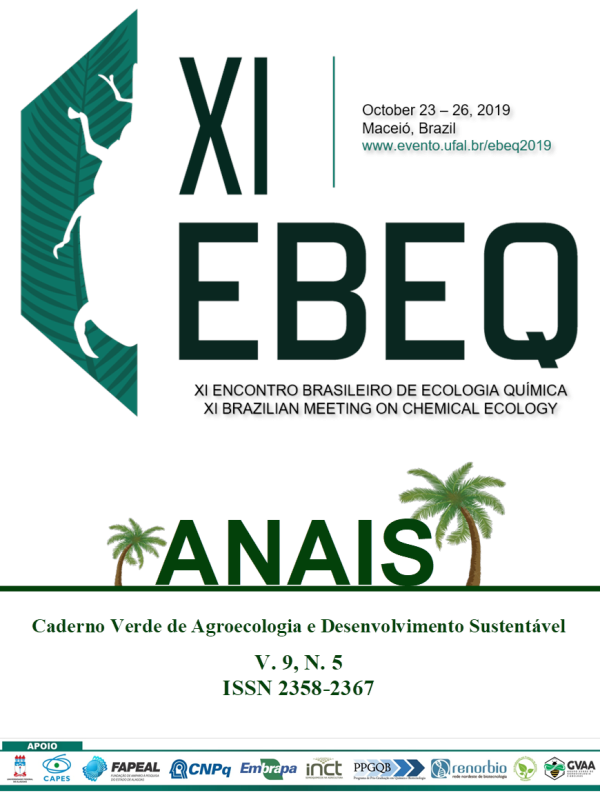EXTRACTION OF ESSENTIAL OIL FROM SEAWEED Laurencia dendroidea USING SUPERCRITICAL FLUID METHOD
Keywords:
Aedes aegypti, Laurencia dendroidea, SUPERCRITICAL FLUIDAbstract
Natural products have been shown to be a promising source of chemicals, accounting directly or indirectly for about 40% of all bioactive compounds available in modern medicine. Extracts and essential oils of plants are described in the literature with potential insecticidal activity, acting against the Aedes aegypti mosquito, but a new area of research that deals with marine organisms has been gaining room for this same purpose. Many secondary metabolites are found in several groups of marine organisms, but most often in cyanophytic, chlorophytic, phaeophytic and rhodophytic algae. Among these organisms, the species of red algae (Rhodophyta) of the Laurencia complex stand out for being sources of terpenes, with several biological activities reported in the literature. In the Chemical Ecology Laboratory of UFPE was obtained essential oil from the algae Laurencia dendroidea, by supercritical fluid technique (Model SFT-100). Extraction lasted about 1h and 30 min. The temperature used in the extraction vessel was 50 ° C and the temperature used at the outlet of the valves was 70 ° C and the CO2 pressure was adjusted 2000 psi to 4000 psi, a 0.47% oil yield was obtained from 13g of dried algae material. The oil was identified using the GC-MS technique with which it was possible to identify compounds belonging to the sesquiterpenes, aldehydes and hydrocarbons classes, the major compounds are silphiperfolan-7-β-ol (9.61%), heptadecane (7, 15%) and pentadecanal (4.91%). The oil was submitted to a preliminary test to evaluate the larvicidal property against A. aegypti. The concentrations 10, 30, 50,60 and 100 ppm were tested, with a mortality of 95,100, 100, 100 and 100% respectively. Thus, the development of larvicides from marine products to reduce the presence of A. aegypti by interrupting its life cycle is essential for the management of this vector.Downloads
Published
How to Cite
Issue
Section
License
Termo de cessão de direitos autorias
Esta é uma revista de acesso livre, em que, utiliza o termo de cessão seguindo a lei nº 9.610/1998, que altera, atualiza e consolida a legislação sobre direitos autorais no Brasil.
O(s) autor(es) doravante designado(s) CEDENTE, por meio desta, publica a OBRA no Caderno Verde de Agroecologia e Desenvolvimento Sustentável, representada pelo Grupo Verde de Agroecologia e Abelhas (GVAA), estabelecida na Rua Vicente Alves da Silva, 101, Bairro Petrópolis, Cidade de Pombal, Paraíba, Brasil. Caixa Postal 54 CEP 58840-000 doravante designada CESSIONÁRIA, nas condições descritas a seguir:
O CEDENTE declara que é (são) autor(es) e titular(es) da propriedade dos direitos autorais da OBRA submetida.
O CEDENTE declara que a OBRA não infringe direitos autorais e/ou outros direitos de propriedade de terceiros, que a divulgação de imagens (caso as mesmas existam) foi autorizada e que assume integral responsabilidade moral e/ou patrimonial, pelo seu conteúdo, perante terceiros.
O CEDENTE mantêm os direitos autorais e concedem à revista o direito de divulgação da OBRA, com o trabalho simultaneamente licenciado sob a Licença Creative Commons do tipo atribuição CC-BY.
O CEDENTE têm autorização para distribuição não-exclusiva da versão do trabalho publicada nesta revista.
O CEDENTE têm permissão e são estimulados a publicar e distribuir seu trabalho online (ex.: em repositórios institucionais ou na sua página pessoal) a qualquer ponto antes ou durante o processo editorial, já que isso pode gerar alterações produtivas, bem como aumentar o impacto e a citação do trabalho publicado.








